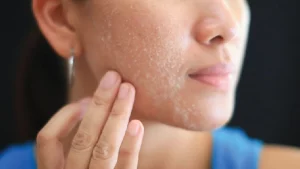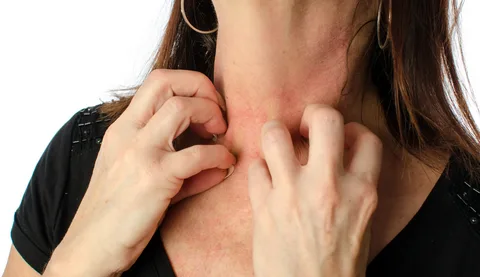Introduction
Nighttime itching can be an incredibly bothersome and disruptive issue that affects many individuals, impacting their quality of sleep and overall well-being. Understanding the reasons behind nighttime itching is crucial for effective management and relief. In this comprehensive guide, we delve into the various factors that contribute to nighttime itching and explore strategies to alleviate this discomfort. Explore More About (Eye Twitching)
Understanding Nocturnal Itching
Nighttime itching, also known as nocturnal pruritus, refers to the sensation of itchiness that intensifies or occurs predominantly during the evening or nighttime hours. This phenomenon can manifest in various forms, including itching of the skin, scalp, or even internal itching sensations.
Causes of Nighttime Itching
Several factors can contribute to nighttime itching, ranging from underlying medical conditions to environmental triggers. Here are some common causes:
1. Dry Skin
One of the leading causes of nighttime itching is dry skin. During the night, especially in colder months or arid climates, the skin’s moisture levels can drop, leading to dryness and itchiness. Areas prone to dryness, such as the legs, arms, and back, may be particularly affected.
2. Allergies
Allergic reactions to environmental allergens such as dust mites, pet dander, or pollen can trigger nighttime itching. These allergens may accumulate in bedding, carpets, or upholstery, exacerbating symptoms when individuals come into contact with them while sleeping.
3. Skin Conditions
Various skin conditions can cause nocturnal itching, including eczema, psoriasis, and dermatitis. These conditions are characterized by inflammation, redness, and itching, which often worsen at night due to factors such as increased blood flow to the skin and changes in temperature and humidity.

4. Insect Bites
Insect bites from mosquitoes, bedbugs, or fleas can lead to localized itching, which may become more pronounced at night as individuals lie still and become more aware of the sensations. Scratching these bites excessively can further irritate the skin and exacerbate itching.
5. Neurological Factors
Neurological conditions such as neuropathy or restless legs syndrome (RLS) can cause nighttime itching due to abnormal nerve sensations or movements. Individuals with RLS may experience an irresistible urge to move their legs, which can exacerbate itchiness and disrupt sleep.
Strategies for Relief
Managing nighttime itching often involves addressing the underlying causes and implementing strategies to alleviate discomfort. Here are some effective approaches:
1. Moisturize Regularly
To combat dry skin and prevent nighttime itching, regular moisturizing is essential. Use emollient-rich creams or ointments that provide long-lasting hydration, especially before bedtime. Focus on areas prone to dryness, such as elbows, knees, and feet.

2. Minimize Allergen Exposure
Reduce exposure to common allergens by implementing allergen-proof bedding covers, regularly washing bedding in hot water, and minimizing indoor air pollutants through proper ventilation and filtration systems. Additionally, vacuuming carpets and upholstery regularly can help remove allergen particles.
3. Treat Underlying Skin Conditions
For individuals with underlying skin conditions such as eczema or psoriasis, appropriate treatment prescribed by a healthcare professional is essential. This may include topical corticosteroids, antihistamines, or immunomodulatory medications to reduce inflammation and itching.
4. Practice Good Sleep Hygiene
Maintaining good sleep hygiene can help minimize nighttime itching and promote restful sleep. Establish a consistent sleep schedule, create a comfortable sleep environment, and engage in relaxation techniques such as meditation or deep breathing before bedtime to reduce stress and anxiety.
5. Seek Medical Evaluation
If nighttime itching persists despite implementing self-care measures, it’s crucial to seek medical evaluation to rule out underlying medical conditions or complications. A healthcare provider can conduct a thorough assessment, perform diagnostic tests if necessary, and recommend appropriate treatment options.
| Strategies | Description |
|---|---|
| Moisturize Regularly | Regular application of moisturizers helps maintain skin hydration and prevents dryness, reducing the likelihood of nighttime itching. |
| Minimize Allergen Exposure | Implementing measures to reduce exposure to common allergens, such as dust mites and pet dander, can alleviate allergic reactions and decrease nighttime itching symptoms. |
| Treat Underlying Skin Conditions | Proper management of underlying skin conditions like eczema and psoriasis through medication and topical treatments can alleviate inflammation and itching, improving overall comfort during nighttime hours. |
| Practice Good Sleep Hygiene | Establishing a consistent sleep schedule, optimizing sleep environment, and engaging in relaxation techniques promote restful sleep, reducing stress and anxiety that may exacerbate itching. |
| Seek Medical Evaluation | Persistent itching may indicate underlying medical conditions or complications that require professional evaluation and treatment. Consulting a healthcare provider allows for accurate diagnosis and personalized management strategies. |
Conclusion
Nighttime itching can significantly impact an individual’s quality of life, affecting sleep, mood, and overall well-being. By understanding the underlying causes and implementing effective management strategies, individuals can find relief from nocturnal itching and enjoy restful nights. Prioritizing skin hydration, minimizing allergen exposure, treating underlying skin conditions, practicing good sleep hygiene, and seeking medical evaluation when needed are essential steps in managing itching effectively.
In conclusion, addressing itching requires a multifaceted approach that addresses both the symptoms and underlying causes. By incorporating these strategies into daily routines, individuals can experience significant relief and improve their overall sleep quality and comfort.










